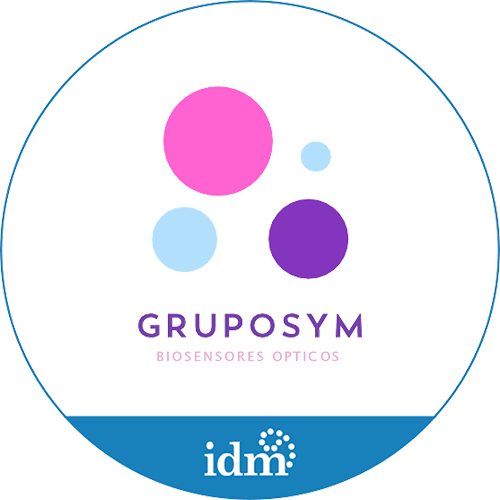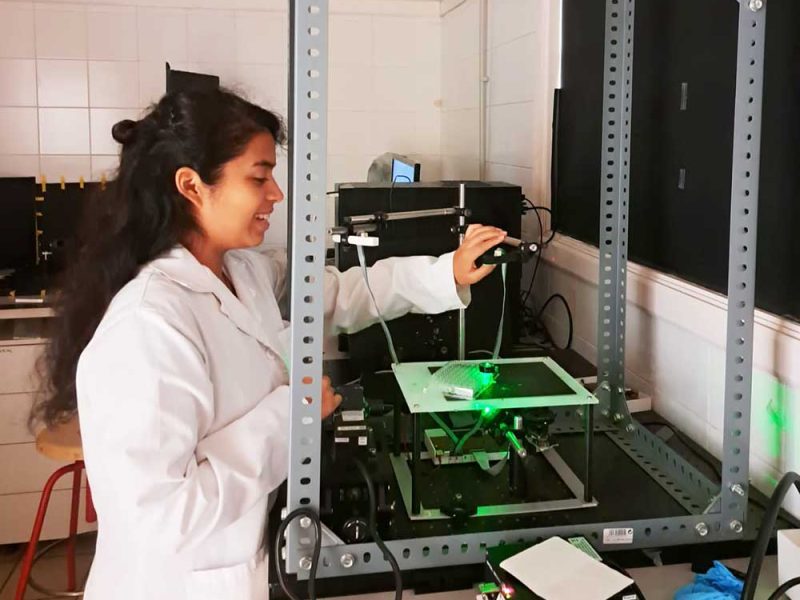Desarrollo de Métodos Integrados para la Determinación de Biomarcadores Genéticos Doctoral student: Martorell Tejedor, Sara Director: Maquieira Catala, Angel; Tortajada-Genaro,…


Holography. A way to tackle new challenges in biosensing.
PROMETEO project
funded by Consellería de Innovación, Universidades, Ciencia y
Sociedad Digital de la Generalitat Valenciana (Ref. PROMETEU/2020/094).
Who we are?
The PROMETEO project is formed by members of the SYM group of the UPV Interuniversity Institute for Molecular Recognition and Technological Development (http://idm.webs.upv.es).
This is an interdisciplinary group that accumulates extensive experience in the topics related to biosensors and bioMEM, surface chemistry for the functionalization and immobilization of probes for different materials (organic and inorganic) and support forms, developing biosensors (the group holds several patents in this regard).
Another line of research is immunochemistry for developing immunoreagents and assays for detecting low molecular weight compounds such as drugs, pesticides, toxins, etc.

Members
Principal Investigator

Rosa Puchades Plá
Ad Honorem Professor

Ángel Maquieira Catalá
Emeritus Professor
Prometeo Research Team

Maria José Bañuls Polo
University Professor

Miguel Ángel González Martínez
University Professor

Luis Antonio Tortajada Genaro
University Professor

Sergi Beñat Morais Ezquerro
University Professor
Prometeo working group

Aitor Cubells Gómez
Advanced technician
of investigation

Amadeo Sena Torralba
Postdoctoral
Investigator

Augusto Miguel Juste Dolz
Advanced technician
of investigation

Elena Ramírez Sánchez
Advanced technician
of investigation

José Eulogio Duch Hurtado
Advanced technician
of investigation

José Martínez Aguilar
Advanced technician
of investigation

Kevin Rodríguez Ríos
Advanced technician
of investigation

Mª Pilar Ortiz Serna
Senior research technician
with a doctorate degree

Pedro Quintero Campos
Senior research technician
with a doctorate degree

Yeray Pallás Tamarit
Advanced technician
of investigation
Project
Prometeo Project
The main objective is to investigate the potential of the principles of holography in biosensing, a very incipient field, and open new ways to develop sensors sensitive to molecular recognition events, giving a selective response without using labels, which will mean characteristics and benefits far superior to the currently available developments. The signal produced will be used to obtain qualitative information on molecular recognition events and determine species of clinical interest.
OBJECTIVE 1
Study and testing of systems for biosensing based on holographic phenomena.
This objective is focused on the fabrication of diffraction gratings for biosensing. Three main activities have been defined:
- – Fabrication of hydrogel surface relief grating by replica moulding.
- – Holographic recording of hydrogel volume transmission gratings.
- – Biograting fabrication by microcontact printing and UV-laser photodeactivation.
OBJECTIVE 2
Preparation and biofunctionalization of holographic sensor materials
This objective includes activities related to the biofunctionalization of hydrogels and supports such as glass, polymers, silicon and silicon nitride to fabricate biogratings.
OBJECTIVE 3
Synthesis, characterization and functionalization of perovskite nanocrystals for biosensing applications
This objective focuses on the synthesis of perovskite nanocrystals for their application in biosensing and ranges from the synthesis of perovskite itself, its encapsulation to its use in biosensing.
OBJECTIVE 4
Proof of concept and demonstration of holographic biosensors in healthcare
This objective involves the development of demonstrators that integrate the results and knowledge of the previous three goals. It includes activities related to bioreagent selection, target selection, and assay development for detecting analytes of interest.
Publications
Scientific production
- Todos
- Patents
- Publications
- Projects
- Thesis
Synthesis and evaluation of antigenic determinants for ß-lactam allergy diagnosis Doctoral student: Peña Mendizabal, Edurne Director: Maquieira Catala, Angel; Morais,…
Metodologías bioanalíticas para el diagnóstico in vitro de alergia a antibióticos ß-lactámicos Doctoral student: Juárez Rodriguez, María José Director: Maquieira…
Study of strategies for genetic variant discrimination and detection by optosensing Doctoral student: Lázaro Zaragozá, Ana Director: Maquieira Catala, Angel;…
Diseño, obtención y caracterización de proteínas recombinantes a partir de determinantes antigénicos asociadas a reacciones alérgicas a ß-lactámicos Doctoral student:…
Holographic biosensors made of DNA-functionalised hydrogels for in vitro diagnostic Doctoral student: Zezza, Paola Director: Maquieira Catala, Angel; Bañuls Polo,…
Biogratings: diffractive transducers for biosensing in photonic platforms Doctoral student: Juste Dolz, Augusto Miguel Director: Maquieira Catala, Angel; Avella-Oliver, Miquel…
William Teixeira, Victoria González-Pedro, María José Bañuls. Ángel Maquieira P202330616 https://aplicat.upv.es/exploraupv/ficha-tecnologia/patente_software/45889
Edurne Peña-Mendizabal, Bruce K. Hua, Ethel Ibañez-Echevarria, Dolores Hernández-Fernández de Rojas, Ángel Maquieira, Stuart L. Schreiber, Sergi Morais Chem. Commun.…
News
No se han encontrado entradas
Join us
Employment opportunities
Description
Description
Send us your CV
Contact us
- Universitat Politècnica de València
- Instituto Interuniversitario de Investigación de Reconocimiento Molecular y Desarrollo Tecnológico (IDM)
- Camí de Vera, s/n, Edificio 5M 1er Piso (IDM), 46022 Valencia, España
- symgrupo@upv.es
- +34 96 387 81 40